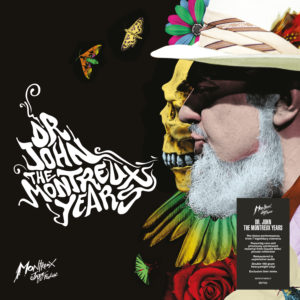Dr. John: The Montreux Years collects recordings from seven of the much-loved singer-pianist’s Montreux Jazz Festival sets. Following the April release of the Tipitina’s Record Club’s Solo Piano: Live In New Orleans 1984, The Montreux Years is this year’s second official Dr. John concert album. It’s available in CD and digital formats and as high-quality two-disc vinyl set, while the Tipitina’s Record Club album is a limited-edition vinyl LP.
Recorded from 1986 to 2012, The Montreux Years features the late Malcolm John Rebennack Jr., a.k.a. Dr. John, performing in varied musical configurations at three Montreux venues. The album’s first four tracks are solo at the piano, a great way to experience the New Orleans keyboard master and grit-and-graveled-toned vocalist. Without a band, his luxurious, propulsive piano playing radiates in all of its glory.
The Montreux Years begins with an exhilarating take on Professor Longhair’s “Professor Longhair Boogie.” More keyboard fireworks arrive with Chris Kenner’s “Sick and Tired,” a rocking performance that borrows the bombastic intro in Huey Smith’s 1958 recording, “Loberta,” aka “Roberta.” Dr. John completes the album’s exuberant four-song solo set with the century-old murder song, “Stack-A-Lee.”
Culled from a period of 26 years, The Montreux Years offers both a variety of repertoire and supporting players. Dr. John’s longtime band, the Lower 911, backs him in several tracks, but adjunct players, including saxophonist Alvin “Red” Tyler (“Accentuate the Positive”) and drummer Freddie Staehle (“Going Back to New Orleans”), add their special touch. For instance, drummer Shannon Powell and Troy “Trombone Shorty” Andrews frolic through a 2011 revival of Professor Longhair’s “Big Chief.”
In a 2007 set at Montreux’s Auditorium Stravinski, Dr. John, the Lower 911 and baritone saxophonist Ronnie Cuber rip it up for an aggressively grooving reimagining of Cole Porter’s “Love for Sale.” Following the ferocity, Dr. John wryly admits: “That ain’t the way Cole Porter composed it.” Along with such extroverted performances, intimate Montreux moments include 2007’s “Rain,” a torchy original ballad that shows the vulnerable, expressive side of Dr. John. However, another of the quieter selections, the piano instrumental “In a Sentimental Mood/Mississippi Mud/Happy Hard Times [Medley],” is frustratingly nebulous.
The power trio of tracks that completes the album begins with “Love for Sale,” continues with a festive “Let the Good Times Roll” from 1995 and, returning to that rousing 1986 solo set, a Lead Belly standard by way of James Booker, “Good Night Irene.” It’s a great way to say adieu.




